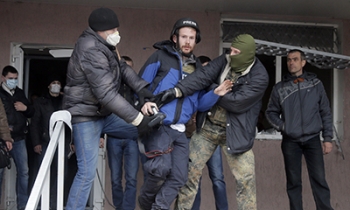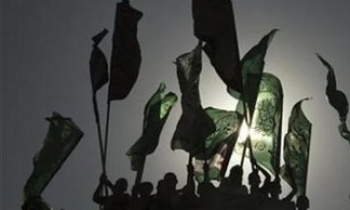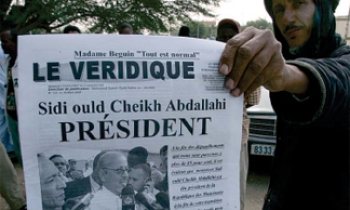Back in the day -- that is, before the year 2001 -- Colorado State University used the U.S. Postal Service, faxes and e-mail to dispatch William Gray's seasonal hurricane predictions to reporters.
Now consider the recently released 2006 report he co-authored: Just a few clicks from the university's home page on the Web, it linked to five downloadable audio and video interviews with Gray, professor emeritus of atmospheric science. And while media demand for the popular forecaster once overwhelmed the school's publicists, the Web-based resources have reduced the number of interview requests even as they actually increased coverage.
The Internet has done more than raise the profile of an already sought-after expert -- Gray was cited in at least 2,000 stories last year alone. It has transformed the very notions of expertise and authority.
Universities and colleges, favorite journalistic hunting grounds for experts, use technology to push forward even obscure specialists, often to the public good. Yet the same search tools that open doors to reporters have emboldened readers to cast a critical eye at purported experts.
Bloggers are especially quick to challenge a source's credentials and to probe suspected agendas or ideological biases. This, in turn, undermines the journalist's claim as an information gatekeeper. It's no longer enough, to borrow a handy if tired device, to simply proclaim "experts say."
"I grew up in an era when we talked about an informed public, but largely we were the ones who informed," says John Lavine, dean of the Medill School of Journalism at Northwestern University.
Now, Lavine says, "the smart media consumer is asking questions not only about experts quoted in the story, but of the reporter writing the story, the editor doing the editing and the media enterprise presenting the story."
To Lavine, this suggests an intriguing response. However they find their sources, reporters have a responsibility to vet them. Why not use technology to make the entire transaction transparent?
For example, online footnotes provided on a newspaper's Web site could explain why particular experts were interviewed. "Post it with the story," Lavine says. A footnote on his own inclusion in this piece, he offers, could say that he ran the Readership Institute at Northwestern, studying what motivates and inhibits people in reading newspapers.
In fact, readers now can ferret out much of the information available to reporters. Gray's hurricane forecast is a case in point. Anyone with enterprise can access Colorado State's Web site, read current and past predictions, scan the charts and maps, and view interview clips with Gray on subjects from global warming to climate factors.
This is the kind of attention the university welcomes. The Web site makes a more detailed public case for Gray's expertise than was ever possible in the printed experts directories that once arrived in the nation's newsrooms with the regularity of new telephone books.
"We know our university's reputation is on the line," says Brad Bohlander, executive director for public relations at Colorado State University in Fort Collins. "We would never try to promote an expert who wasn't. That's the key."
You can find university Web sites where faculty members are identified as experts simply by virtue of their willingness to take press calls. But the trend is in another, more selective direction.
Take The Annapolis Group, a consortium of more than 120 liberal arts colleges from California to Maine. Realizing that, individually, they could not compete against the stables of experts at larger schools like UC Berkeley or Johns Hopkins University, they banded together. Each school is allowed to put forth no more than a dozen experts for its online-only directory, found at www.collegenews.org.
"We wanted to have the creme de la creme of faculty experts," says Mike Debraggio, executive director of communications at Hamilton, a member college in New York, who was involved in creating the guide.
At Boston's Northeastern University, which has more than 800 full-time faculty, the public relations office does its own advance reporting, determining who on campus knows what so it is ready when news breaks. Recently, the school's Web site advertised a timely advisory -- "Northeastern University Experts Available to Comment on Gay Marriage Ban" -- previewing what one, political science professor William G. Mayer, would have to say.
"We don't always have to go to them," Renata Nyul, a Northeastern media relations specialist, says of reporters. "They know to monitor the Web site."
Back in 1992, as head of public relations at the State University of New York at Stony Brook, Dan Forbush was inspired by a new tool called e-mail to link reporters with experts in his university system. He later sent invitations to his counterparts at 900 colleges and universities. His pitch: "Hey, join the experiment!"
ProfNet, perhaps the best-known online expert service, was born.
Forbush's initial list of 200 takers has grown to 600 schools. (The name -- shorthand for Professors' Network -- came to him one day while he was running.)
When PR Newswire, which distributes press releases from thousands of organizations, acquired ProfNet in 1996, it enabled the service to more fully anticipate reporters' needs. "Say there's a nomination of a new Supreme Court justice. We ask our members, `Who do you have on Supreme Court nominations?"' explains Forbush, now ProfNet's president. The resulting list of names can be transmitted to 4,200 news organizations and 3,600 Web sites.
Forbush calculates that last year ProfNet transmitted 30,000 queries from about 10,000 journalists. This summer, it will roll out an entirely new system, making experts more widely available -- including to bloggers.
Not all academics are trained for this sort of exchange. Jonathan Zimmerman, professor of education and history at New York University, points out that many educators speak to a very narrow audience -- primarily the handful who will review their books. "Newspapers," he says, "want you to speak to 100,000 people."
Zimmerman writes opinion pieces for newspapers and knows something of how journalists work -- and how academics tend to respond. "What journalists are often looking for is a policy prescription: `Should we remain in Iraq or shouldn't we?"' he explains. "In people's scholarly work, they are often not prescriptive, but when the (New York) Times comes calling, they become very much so."
This is where Lavine's transparency suggestion could come into play, giving readers a glimpse behind the quote. In this spirit, perhaps universities and colleges will be persuaded to provide their own links to experts' scholarly works.









